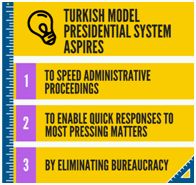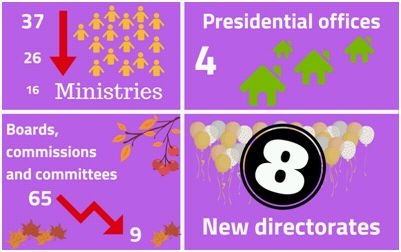Following the general elections on Jun 24, 2018, Turkey prepares to adopt the "Turkish Model" Presidential System, the patent of which Mr. Erdoğan claims. It is explained that the new system aspires to speed up administrative proceedings by eliminating bureaucracy and enabling quick responses to the most pressing matters.
The change begins
The first step to the Turkish Presidential System is taken by Statutory Decree No. 698 of 74 articles, which was published in the Official Gazette on July 4, 2018. The statutory decree moves to abolish the post of Prime Minister, known to be the "executive branch's second powerful seat", and transfer powers of the Council of Ministers to the President by amending a wide variety of legislation. This was followed by a second statutory decree (No. 699) amending certain provisions of the Presidential Election Law.
 As the Turkish Government continues
to adapt to the new administrative system, the first three
Presidential Decrees were published in the Official Gazette on July
10, 2018. The first Presidential Decree sets forth the principles
and organization of the Presidential post. The other two are of a
particular significance since they move to change the structure of
regulatory institutions and organizations. Terms of duty for
members and presidents of these organizations have changed. Most
importantly, these members and presidents, who were formerly
recommended by different posts such as ministries, will now be
appointed directly by the President.
As the Turkish Government continues
to adapt to the new administrative system, the first three
Presidential Decrees were published in the Official Gazette on July
10, 2018. The first Presidential Decree sets forth the principles
and organization of the Presidential post. The other two are of a
particular significance since they move to change the structure of
regulatory institutions and organizations. Terms of duty for
members and presidents of these organizations have changed. Most
importantly, these members and presidents, who were formerly
recommended by different posts such as ministries, will now be
appointed directly by the President.
Structural changes
With the abovementioned decrees, comes a series of structural changes as it moves to dramatically decrease the number of ministries which was 37, a number considered excessive by Mr. Erdoğan himself. The number of Ministries was earlier reduced to 26 and is now reduced to 16. Treasury, which used to be an Undersecretariat, is granted the status of ministry along with the Ministry of Finance. The two will now be referred to as the Ministry of Treasury and Finance. Similarly, the Ministry of Family and Social Policy and the Ministry of Labor and Social Security merges into one single ministry. On a more interesting note, the Ministry for European Union Affairs has been abolished. Although the foregoing is stated to have merged with the Ministry of Foreign Affairs, the name does not suggest the same. It is yet to be discovered how this will affect relations with the European Union.
The "Turkish Model" also moves to merge 65 former boards, commissions and committees into the following nine:
- Science, Technology and Innovation Policies Board
- Education and Teaching Policies Board
- Economy Policies Board
- Security and Foreign Policies Board
- Judicial Policies Board
- Culture and Art Policies Board
- Health and Food Policies Board
- Social Policies Board
- Local Administration Policies Board
 The foregoing will consist of
business persons, professionals from the culture and arts sector
and experts in the following fields: technology, science, economy
and foreign policies. These Boards will work vis-à-vis the
President and report only to the President. They will also assume
communication with ministers and "give feedback" in
developing policy proposals, overseeing implementation of these
policies as well as preparing progress reports. As Mr. Erdoğan
stated in his speech on June 22, 2018, these Boards will also
conduct "any other work which is deemed suitable by the
President."
The foregoing will consist of
business persons, professionals from the culture and arts sector
and experts in the following fields: technology, science, economy
and foreign policies. These Boards will work vis-à-vis the
President and report only to the President. They will also assume
communication with ministers and "give feedback" in
developing policy proposals, overseeing implementation of these
policies as well as preparing progress reports. As Mr. Erdoğan
stated in his speech on June 22, 2018, these Boards will also
conduct "any other work which is deemed suitable by the
President."
The new system also introduces four presidential offices:
- The Digital Transformation Office
- Finance Office
- Human Resources Office
- Investment Office
These offices will be authorized to coordinate all institutions and associations operating in their field of activity. Foregoing offices are expected to be the closest posts to the President within the scope of the new administrative system.
Last but not least, there will be eight new directorates including but not limited to the Directorate of Defense Industries, Directorate of Strategy, National Intelligence Organization and Budget and Directorate of Religious Affairs. These directorates will also work under direct orders of the President.
Considering all of the above, will the new administrative system meet its great expectations? That, we will have to wait and see moving forward.
The content of this article is intended to provide a general guide to the subject matter. Specialist advice should be sought about your specific circumstances.


